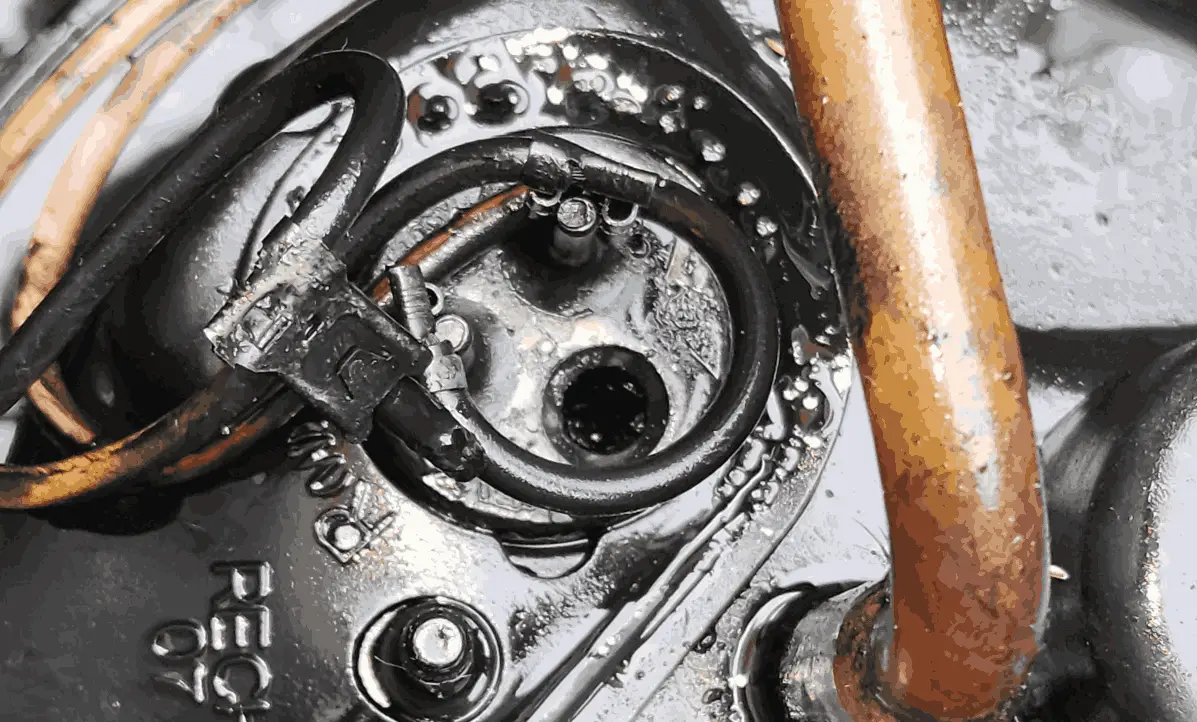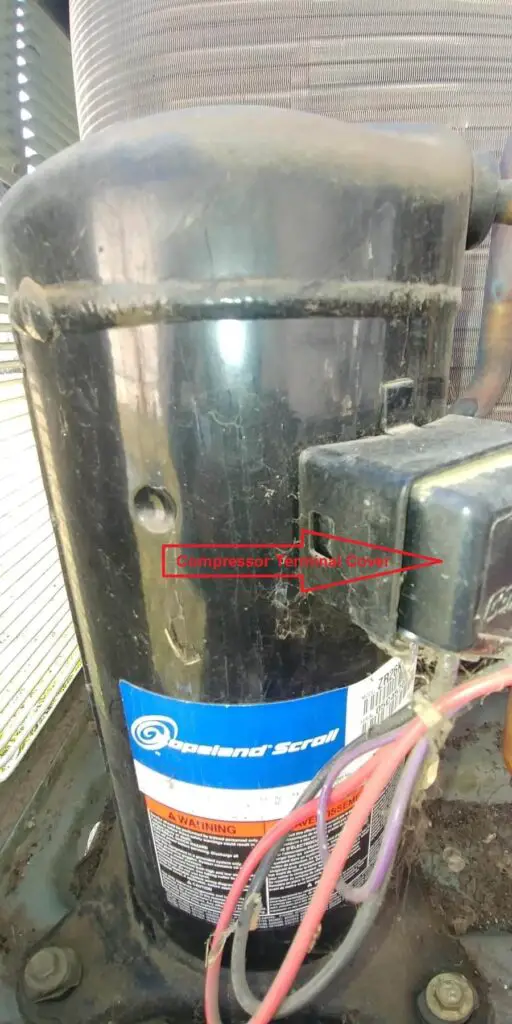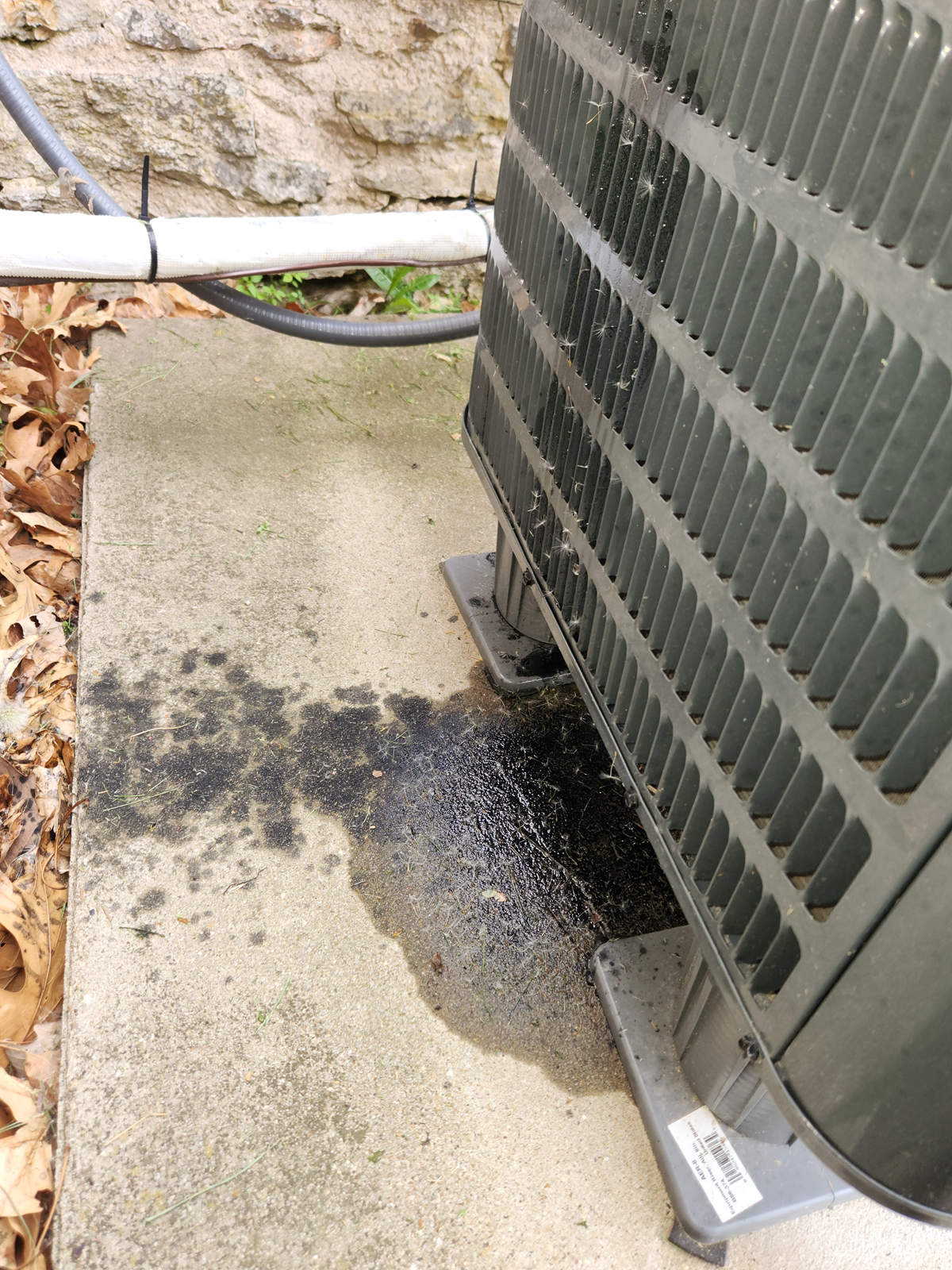Air conditioner compressors can explode. I’ve had it happen twice since 1977. Figure the odds. The first was in about 1980 at the Portland airport, and the second was in Illinois in 2023.
Compressors have a cover over the electrical terminals. That cover is held on with either a spring steel strap or snaps into terminal housing. This cover is to protect anyone near the air conditioner. I can’t tell you how much protection.
The terminal housing is where the electrical wires are attached to the compressor. The compressor wire terminals penetrate the steel compressor housing through what I call a soft plug. That’s where she blows.
Symptoms Of An Air Conditioner Blast
One symptom of an exploded compressor is oil everywhere. You may not be near the unit when it blows, but oil will be all around the base.

If you’re unfamiliar with what burning refrigerant smells like, it’s beyond most bad smells. I could find no evidence but was always told that burning Freon creates Agent Orange, but that’s just a bunch of shop talk. I’ve been in situations where I had to hold my breath to get a little welding done.
What Can Cause A Compressor To Explode?
The unit at the airbase was three-phase, with two compressors, which gave me a hint of what to look for, and I knew that before I started up the two new replacement compressors, I had to find a reason for the explosive failure.
I was somewhat disadvantaged because I was not a seasoned technician then. But I was determined to find this problem. And you should know that it is many years later, and I’m missing some detailed parts of the story.
But, this much I can remember. There was a factory error in the wiring. Cross-wiring in the compressor contactors. It would have damaged my ego and upset my employer if I had started the two new replacement compressors without finding the cause of the blast.
Of course, I was responsible for checking all wiring before a startup.
I have a ground source heat pump that conditions the first floor of my house. It ran for about two months and dumped the refrigerant. When examining the unit to find the leak, I found the capillary tube from the TXV valve had vibrated against another copper tube in the unit and rubbed a hole into the copper line.
My supplier told me it was my job to check for everything when starting a unit. I politely agreed, and he gave me a new TXV valve. And I do spend some time looking for that kind of factory foul-ups.
What Are The Safety Measures When Working On A Compressor?
Number one is never to operate a compressor with the terminal cover off. As flimsy as these covers may seem, they can be a life-saving barrier between an explosion and the technician.

Homeowners should never be in a position for that to be a concern.
What Else Causes An AC Compressor Failure?
Compressors fail for many reasons. The heart of a refrigeration compressor is an electric motor surrounded by a mixture of refrigerant (Freon) and oil. The motors have copper windings coated with a shellac or varnish that insulates the wire from shorting out.
This coating can break down and cause the compressor to have an electrical short. Either shorting across the windings or shorting from a winding to ground.
A compressor’s internal workings need lubrication. The oil at the bottom of the compressor (like the oil in your car’s engine) is moved throughout the system with the refrigerant. Enough oil needs to remain in the compressor for lubrication.
Refrigerant tends to migrate to the coldest place. If a compressor is left off for enough time, refrigerant can migrate to the bottom of the compressor under the oil.
When the compressor starts, the oil can be washed out of the compressor, causing damage to parts that were made only to pump vapor, not vast amounts of liquid. This is why compressors have or should have a crankcase heater. It keeps the bottom of the compressor warm and the refrigerant above the oil.
It is not so critical for AC units because they are primarily run in the warm summer. But heat pumps that are operated year-round need that heated area to make good starts without the washout of oil.
Conclusion
Safety is always number one.
Even refrigerants that are not burning are hazardous to breathe. They can smell like a variety of other things. I ran an experiment once and asked a bunch of people what they thought Freon smelled like. I thought it was a fun article.
I did run into this statement in an installation manual for a Daikin Mini Split…….
• When installing or relocating the system, be sure to keep the refrigerant circuit free from all substances other than the specified refrigerant (R410A), such as air.
daikinac.com
(Any presence of air or other foreign substance in the refrigerant circuit causes an abnormal pressure rise which may result in rupture, resulting in injury.)

